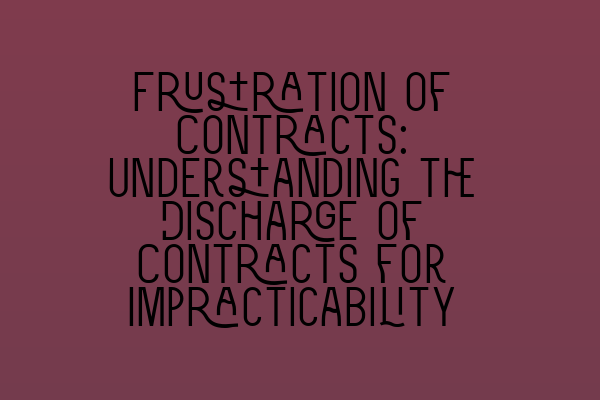Frustration of Contracts: Understanding the Discharge of Contracts for Impracticability
Contracts are the bedrock of business transactions and legal agreements. They provide a framework for parties to fulfill their obligations and enjoy the benefits of their agreements. However, there are instances where unforeseen circumstances can render a contract impossible to perform, ultimately leading to its discharge. This legal concept is known as frustration of contracts.
In this blog post, we will delve into the intricacies of frustration of contracts, specifically focusing on the discharge of contracts for impracticability. We will explore the legal principles, examples of real-life case studies, and provide insights into the decision-making processes within legal practice.
Understanding Frustration of Contracts
Frustration of contracts occurs when an unforeseen event or circumstance arises, making it impossible for one or both parties to perform their contractual obligations. It is important to note that frustration is distinct from non-performance due to breach of contract, as frustration arises from events outside the control of the parties involved.
One of the key principles related to frustration is the doctrine of impossibility or impracticability. This doctrine recognizes that performance of a contract may become legally impossible or unreasonably burdensome due to unforeseen events that were not anticipated by the parties at the time of contract formation.
Impracticability refers to situations where the performance of a contract becomes excessively difficult or financially burdensome, as opposed to truly impossible. The courts will assess whether the event was unforeseeable and whether it has fundamentally changed the nature of the contract.
Real-Life Case Studies
To gain a deeper understanding of frustration of contracts, let’s examine some real-life case studies:
Factors Affecting Frustration of Contracts
Several factors can contribute to the frustration of contracts. These factors include:
- Government regulations
- Physical damage or destruction of the subject matter
- Unforeseen events such as natural disasters
- Illness or death
- Changes in law
It is crucial to remember that frustration is not intended to provide an easy way out of contractual obligations, but rather to address genuine cases where performance has become impossible or impracticable due to unforeseen circumstances.
Decision-Making in Legal Practice
Legal practitioners play a pivotal role in determining whether frustration of contracts applies in a given situation. They evaluate the circumstances, review the relevant legal principles, and provide guidance to their clients.
For further insights into legal practice and decision-making, check out this article: Unveiling Real-Life Case Studies: Insights into Legal Practice and Decision-Making.
Conclusion
Frustration of contracts is a complex legal concept that arises when unforeseen events render contractual performance impossible or impracticable. Understanding the doctrine of frustration and its application is crucial for both solicitors and their clients.
For more information on other legal topics, such as solicitor salaries, client relationship management skills, law school education, and securing training contracts, check out these related articles:
- Exploring Solicitor Salaries in the UK: Average Earnings and Factors Affecting Income
- Mastering Client Relationship Management: Skills for Solicitors to Enhance Trust and Loyalty
- Pursuing a Law School Education in the UK: Choosing the Right Path for Your Future
- Securing Training Contracts: A Roadmap to Becoming a Solicitor
